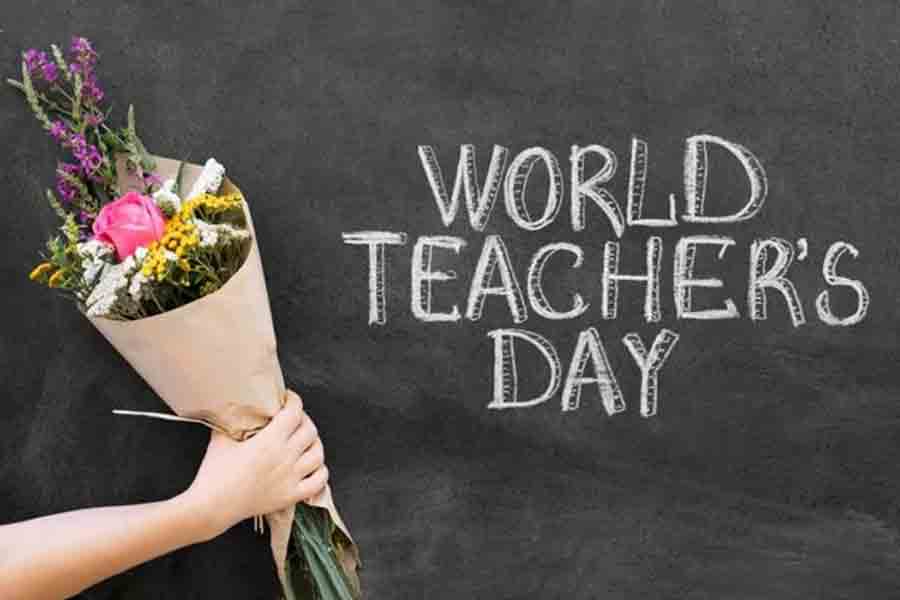
Published :
Updated :

The observance of the World Teachers' Day on October 5 was mostly a muted affair in this country. There is nothing to be surprised at the event passing so quietly. In a country where teachers, particularly those of the primary and secondary schools, are systematically neglected, why should such a day be given the spotlight it deserves elsewhere? Following the July-August uprising, this country was a witness to a mob culture among students. They subjected the very teachers from whom they learnt lessons to humiliation and forcible resignation and in some cases brutal physical assaults.
Primary and secondary school teachers' status has also been undermined by the archaic and rigid government system. An assistant teacher of a government primary school is placed under grade 13 with a basic salary of Tk 11,000 whereas a driver requiring a qualification of class VIII is under grade 12. Teachers of secondary schools enjoying monthly pay order (MPO) start their career with Tk 12,500. An assistant teacher can end up his/ her career without ever getting a promotion.
When primary teachers serving as the architect of nation-building are so underestimated and relegated, the consequences are bound to be self-defeating. It is the primary teachers who are responsible for the foundational education of children. When teachers are ranked below or on a par with drivers, clerks and computer operators and the salary they draw is too meagre to run their families, they are socially undermined and financially deprived. Expectation that they would give their cent per cent to their professional call thus never materialises.
What is particularly galling is that teachers in this country get the lowest remuneration in South Asia. The average salary of a primary teacher here is a little over $170 whereas in Myanmar holding the immediate higher slot, it is $189 a month. Other countries in the region are far ahead. Low pay package obviously fails to attract meritorious candidates. Thus primary education has failed to serve the very purpose of shaping the future of students. The customary education most primary teachers impart fail to match the demanding and inspired learning of modern time.
The fact that weakness in reading and numeracy among primary students is persistent has been highlighted by different studies. According to the United Nations Children's Fund (UNICEF), 66 per cent third graders have no foundational skill of their Bangla text book and 82 per cent are found wanting in numeracy skill. Another study concludes that almost half of the students in the primary grades cannot read Bangla at their grade levels and two-thirds cannot do basic arithmetic.
Weakness in the foundational education at the primary level is carried over to the secondary level. With three streams of education ---general, madrasah and English medium---prevailing, the country has failed to frame a suitable education policy. Then there is the polytechnic education at this level. Its syllabus is a mix of general and technical education. The English medium has nothing to do with the local curricula, it follows the international curricula such as the Cambridge International, Pearson Edexel and International Baccalaureate (IB) programmes. Madrasah education has two categories---Alia madrasah and Qwami madrasah. Alia madrasahs are regulated by the Bangladesh Madrasah Education Board but not the Qwami madrasahs. They follow curricula different from each other.
The different types of education offered have made the task of skill development of human resources difficult. It is the mainstream general education that matters most in a situation like this. It has been subjected to various experiments like a shift from the traditional evaluation system of students' performance on the basis of scores. Instead of first, second and third divisions, grading system was introduced. A form of creative education was also introduced without adequately preparing teachers to undertake such a challenging task. The intention was appreciable but there was not adequate preparation for attaining the objectives.
Then comes the transition of the levels of primary education from the traditional class V to class VIII and the secondary education from class IX to class XII. Again, this academic system was given up in favour of the 2010 system following the fall of Sheikh Hasina government. One batch of students has already completed the class IX syllabus. Secondary School Certificate (SSC) examinations of this batch of students will be held on the syllabus of only class X.
The Qudrat e Khuda education commission also suggested for the primary level to cover up to class VIII and the secondary up to class XII. The purpose was to develop skilled manpower. Students not as bright as those pursuing higher education better be allowed to opt for careers on the basis of skills acquired. If they complete the course of education up to class XII, pursuance of a career is likely to be easier. But successive governments failed to implement the suggestions.
Thus education has now been commercialised at its maximum with coaching centres and tutors replacing classroom teaching. Below quality teachers infiltrating the education sector or teachers qualified enough spending their time and energy in coaching centres in order to ensure that they do not have to rely on the meagre salary have vitiated learning environment. The mismatch in the education sector shows no sign of coming to an end. Students of poor families cannot afford coaching fees and it is no surprise that 33 per cent students drop out at the secondary level. As a result, a discriminatory system of education has developed. Without addressing this discrimination, the country's development will remain illusive. The overwhelming need is to increase the budgetary allocation for education and gradually narrow the gap of opportunities for the underprivileged.
nilratanhalder2000@yahoo.com


 For all latest news, follow The Financial Express Google News channel.
For all latest news, follow The Financial Express Google News channel.